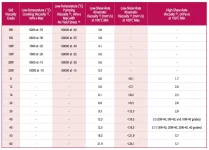If the owners manual gives you choices, then use whatever you want.
Hyundai/kia was already warned concerning OE filters. You don't need to use Hyundai/Kia filters.
https://www.bodyshopbusiness.com/fe...ce-warning-to-hyundai-over-warranty-language/
My recommendation, because of some garbage engineering and/or supplier issues that Hyundai will never fess up to, is to use the thickest grade in your owners manual, in full synthetic, considered safe for you weather conditions.
Both of my NA theta-ii's recommend conventional 5w20 oil. I use full synthetic 5w30. My theta-ii turbo recommends conventional 5w30 and I used 5w40. And, because I don't want to be one with clattering engine disease, or permanently stalling when needed(aka seizing), I practice the severe service interval and check the oil level weekly keeping them full always.
I've used 15w50 in Northern winters(Me/NH/VT) and never had an issue with my engines many years ago.... always starting every cold day with no problems all winter. So, I don't see ANY problem with using a 5w30, 10w30, or 5w40, year round, unless you plan on trips to the north pole during winter. Moronic tech writers recommend ACEA A5 or above, but don't define 'above'. They recommend API SM or above which is easy to understand since SN, SN+, and now SP are API's newer specs. So, use API SM or 'newer'. And, ILSAC GF4 or above, like GF5 and now GF6. They even allow ACEA A3. And, as long as it meets "1", you're covered. ACEA or API or ILSAC or 0w20 or 5w20 or 5w30 or 10w30 and you're good! If the start/stop is often exercised, might toss in a 0w30 too! See, 0w exceeds the cold weather capability of 5w or 10w and the 30 is equivalent regardless!
Concerning multi grade and single grade...
A prefix with have the "w". A suffix will not. A multi-grade will have one prefix and one suffix.
In the attached picture, the left column is a list of single grades.
Single grade prefixes... 0w, 5w, 10w, 15w, 20w, 25w
Single grade suffices... 8, 12, 16, 20, 30, 40(x2), 50, 60
Combing 1 prefix and 1 suffix is a multi-grade.
To prevent confusion, and because some grades 'overlap', a multigrade can only use 1 suffix and 1 prefix.... In the old days, a 0w30 could be labelled a 0w/5w/10w-30 but not anymore. How about a 0w/5w-40, or a 0w-16/20? No more confusion is allowed for simple consumer minds.
HTHS is another ballgame.
The finance guy at Kia recently told use we must use OE filters. I told him to go pound sand in a very uncensored way. He said that Wix filters will leak. I let him know that Wix and Hyundai filters cruise down the same Korean assembly line and the only difference is the extra baseplate hole needed to meet 'other' automaker requirements. I guess the cost to drill that hole exceeds the Hyundai/Kia budget for bulk filter purchasing.


